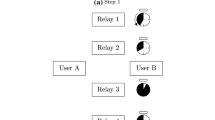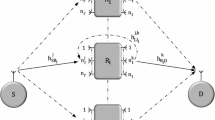Abstract
In this paper, a decode-and-forward cooperative interference-limited multiple relay network is considered. An efficient relay selection strategy and its performance analysis are proposed, where only the relay nodes are affected by multiple interferences. In the proposed relay selection scheme, the selected relay is not always used, depending on the power of interferences and the channel state information of all links, while the direct path between source and destination is always used. For analytical tractability the distribution of interference-limited channel is approximated as an exponential distribution with high accuracy. Analysis of cooperative networks with interference-limited relays can be performed using the approximate exponential distribution by the same methods which have been used without interferences. We derive the bit error probability and outage probability of the proposed opportunistic max-min relay selection (OMRS) scheme in independent non-identically distributed Rayleigh fading channels. Numerical results present the superiority of OMRS over the conventional relay selection scheme which always uses the selected relay path. The exactness of the approximate analysis for interference-limited relays is also shown in numerical results.
Similar content being viewed by others
References
Sendonaris A., Erkip E., Aazhang B. (2003) User cooperation diversity-Part I: System description. IEEE Transactions on Communications 51(11): 1927–1937
Sendonaris A., Erkip E., Aazhang B. (2003) User cooperation diversity-Part II: Implementation aspects and performance analysis. IEEE Transactions on Communications 51(11): 1939–1948
Laneman J. N., Tse D. N. C., Wornell G. W. (2004) Cooperative diversity in wireless networks: Efficient protocols and outage behavior. IEEE Transactions on Information Theory 50(12): 3062–3080
Hunter T. E., Nosrantinia A. (2006) Diversity through coded cooperation. IEEE Transactions on Wireless Communications 5(2): 283–289
Hunter T. E., Sanayei S., Nosrantinia A. (2006) Outage analysis of coded cooperation. IEEE Transactions on Information Theory 52(2): 375–391
Zou Y., Zheng B., Zhu W. (2009) An opportunistic cooperation scheme and its BER analysis. IEEE Transactions on Wireless Communications 8(9): 4492–4497
Zou Y., Zheng B., Zhu W. (2009) Outage analysis of opportunistic cooperation over Rayleigh fading channels. IEEE Transactions on Wireless Communications 8(6): 3077–3085
Onat F. A., Adinoyi A., Fan Y., Yanikomeroglu H., Thompson J. S., Marsland I. D. (2008) Threshold selection for SNR-based selective digital relaying in cooperative wireless network. IEEE Transactions on Wireless Communications 7(11): 4226–4237
Onat F. A., Fan Y., Yanikomeroglu H., Thompson J. S. (2008) Asymptotic BER analysis of threshold digital relaying schemes in cooperative wireless systems. IEEE Transactions on Wireless Communications 7(12): 4938–4947
Jing Y., Jafarkhani H. (2009) Single and multiple relay selection schemes and their achievable diversity orders. IEEE Transactions on Wireless Communications 8(3): 1414–1423
Bletsas A., Khisti A., Reed D. P., Lippman A. (2006) A simple cooperative diversity method based on network path selection. IEEE Journal of Selected Areas in Communications 24(3): 659–672
Barua B., Ngo H. Q., Shin H. (2008) On the SEP of cooperative diversity with opportunistic relaying. IEEE Communications Letters 12(10): 727–729
Adinoyi A., Fan Y., Yanikomeroglu H., Poor H. V., Al-Shaalan F. (2009) Performance of selection relaying and cooperative diversity. IEEE Transactions on Wireless Communications 8(12): 5790–5795
Zhou Q. F., Lau F. C. M., Hau S. F. (2009) Asymptotic analysis of opportunistic relaying protocols. IEEE Transactions on Wireless Communications 8(8): 3915–3920
Ikki S., Ahmed M. H. (2009) Exact error probability and channel capacity of the best-relay cooperative-diversity networks. IEEE Signal Processing Letters 16(12): 1051–1054
Ikki S., Ahmed M. H. (2010) Performance analysis of adaptive decode-and-forward cooperative diversity networks with best-relay selection. IEEE Transactions on Communications 58(1): 68–72
Michalopoulos D., Karagiannidis G. (2009) Performance analysis of single relay selection in Rayleigh fading. IEEE Transactions on Wireless Communications 7(10): 3718–3724
Choi W., Kim D. I., Kim B. (2010) Adaptive multi-node incremental relaying for hybrid-ARQ in AF relay networks. IEEE Transactions on Wireless Communications 9(2): 505–511
Costa D. B., Aïssa S. (2010) Amplify-and-forward relaying in channel-noise-assisted cooperative networks with relay selection. IEEE Communications Letters 14(7): 608–610
Chen H., Liu J., Zheng L., Zhai C., Zhou Y. (2010) An improved selection cooperation scheme for decode-and-forward relaying. IEEE Communications Letters 14(12): 1143–1145
Krikidis I., Thompson J., McLaughlin S., Goertz N. (2009) Max-min relay selection for legacy amplify-and-forward systems with interference. IEEE Transactions on Wireless Communications 8(6): 3016–3027
Zhaong C., Jin S., Wong K.-K. (2010) Dual-hop systems with noisy relay and interference-limited destination. IEEE Transactions on Communications 58(3): 764–768
Si J., Li Z., Liu Z. (2010) Outage probability of opportunistic relaying in Rayleigh fading channels with multiple interferers. IEEE Signal Processing Letters 17(5): 445–448
Suraweera H. A., Garg H. K., Nallanathan A. (2010) Performance analysis of two hop amplify-and-forward systems with interference at the relay. IEEE Communications Letters 14(8): 692–694
Kim J.-B., Kim D. (2010) Exact and closed-form outage probability of opportunistic decode-and-forward relaying with unequal-power interferers. IEEE Transactions on Wireless Communications 9(12): 3601–3606
Lee D., Lee J. (2011) Outage probability for dual-hop relaying systems with multiple interferers over Rayleigh fading channels. IEEE Transactions on Vehicular Technology 60(1): 333–338
Kim, S.-I., & Heo, J. (2010). An efficient relay selection strategy for interference limited relaying networks. In Proceedings of PIMRC2010.
Shah A., Haimovich A. M. (2000) Performance analysis of maximal ratio combining and comparison with optimum combining for mobile radio communications with cochannel interference. IEEE Transactions on Vehicular Technology 49(4): 1454–1463
Chayawan C., Aalo A. (2003) Average error probability of digital cellular radio systems usign MRC diversity in the presence of multiple interferers. IEEE Transactions on Wireless Communications 2(5): 860–864
Yang L., Alouini M. S. (2006) Performance comparison of different selection combining algorithms in presence of co-channel interference. IEEE Transactions on Vehicular Technology 55(2): 559–571
Simon M. K., Alouini M.-S. (2000) Digital communication over fading channels. Wiley, New York
Papoulis A., Pillai S. U. (2002) Probability, random variables and stochastic processes (4th ed.). McGrow Hill Editions, New York
Author information
Authors and Affiliations
Corresponding author
Rights and permissions
About this article
Cite this article
Kim, SI., Kim, S., Kim, J.T. et al. Opportunistic Decode-and-Forward Relaying with Interferences at Relays. Wireless Pers Commun 68, 247–264 (2013). https://doi.org/10.1007/s11277-011-0449-6
Published:
Issue Date:
DOI: https://doi.org/10.1007/s11277-011-0449-6




